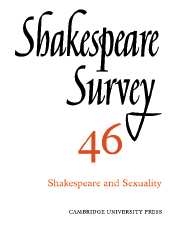Book contents
- Frontmatter
- Shakespeare and Sexuality
- As Who Liked It?
- Malvolio and the Eunuchs: Texts and Revels in Twelfth Night
- The Scandal of Shakespeare’s Sonnets
- Weaving and Writing in Othello
- ‘That’s She that was Myself’: Not-so-Famous Last Words and Some Ends of Othello
- ‘The Catastrophe is a Nuptial’: The Space of Masculine Desire in Othello, Cymbeline, and The Winter’s Tale
- Reconstructing The Winter’s Tale
- Late Shakespeare: Style and the Sexes
- The Virgin Not: Language and Sexuality in Shakespeare
- Fleshing his Will in the Spoil of her Honour: Desire, Misogyny, and the Perils of Chivalry
- Bowdler and Britannia: Shakespeare and the National Libido
- Shakespeare and the Ten Modes of Scepticism
- Shakespeare Performances in England, 1992
- Professional Shakespeare Productions in the British Isles, January-December 1991
- 1 Critical Studies
- 2 Shakespeare’s Life, Times, and Stage
- 3 Editions and Textual Studies
- Books Received
- Index
1 - Critical Studies
Published online by Cambridge University Press: 28 March 2007
- Frontmatter
- Shakespeare and Sexuality
- As Who Liked It?
- Malvolio and the Eunuchs: Texts and Revels in Twelfth Night
- The Scandal of Shakespeare’s Sonnets
- Weaving and Writing in Othello
- ‘That’s She that was Myself’: Not-so-Famous Last Words and Some Ends of Othello
- ‘The Catastrophe is a Nuptial’: The Space of Masculine Desire in Othello, Cymbeline, and The Winter’s Tale
- Reconstructing The Winter’s Tale
- Late Shakespeare: Style and the Sexes
- The Virgin Not: Language and Sexuality in Shakespeare
- Fleshing his Will in the Spoil of her Honour: Desire, Misogyny, and the Perils of Chivalry
- Bowdler and Britannia: Shakespeare and the National Libido
- Shakespeare and the Ten Modes of Scepticism
- Shakespeare Performances in England, 1992
- Professional Shakespeare Productions in the British Isles, January-December 1991
- 1 Critical Studies
- 2 Shakespeare’s Life, Times, and Stage
- 3 Editions and Textual Studies
- Books Received
- Index
Summary
GENERAL STUDIES AND COLLECTIONS
Shakespeare criticism is under particular pressure at the moment. The clash of different critical perspectives has been a constant feature of these surveys, but Ivo Kamps’ collection of essays, Shakespeare Left and Right (New York and London: Routledge, 1991), which begins with four papers originally presented at a Special Session of the MLA on ‘The Role of Ideology’, powerfully indicates the ways in which the internal squabbles of the academy have suddenly come to matter in the world outside. In Britain, the Conservative Government’s co-option of Shakespeare in their attack on ‘lefty’ teaching in schools has an analogous effect in the focusing of critical minds, and to that challenge Lesley Aers and Nigel Wheale respond with their anthology Shakespeare in the Changing Curriculum (London and New York: Routledge, 1991). Whatever one might think of these collections, and both have a tendency to a strident querulousness, their effect is to superimpose upon familiar questions of the relationship between text and critic an urgent need to focus on the relationship of literary criticism to the audience for whom it is written. But one of the sharpest perceptions that come from attempting such a survey as this is a depressing sense of a fragmented landscape where critics call only to the like-minded, a feeling which becomes stronger as the volume of work continues to grow. (There is little sign of a world recession in Shakespeare criticism, and the plenitude of book-length studies has forced an even more restricted notice of critical articles in this year's survey.)
- Type
- Chapter
- Information
- Shakespeare Survey , pp. 205 - 220Publisher: Cambridge University PressPrint publication year: 1993



